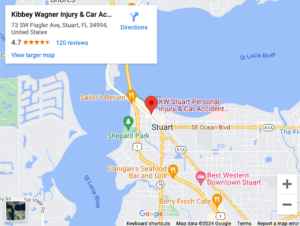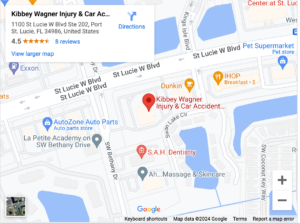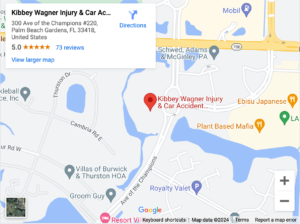
Negotiation is the process of talking your way out of a dispute and, hopefully, into a deal. In the context of a personal injury claim, it means determining liability and fixing an amount that one party will pay to the other as compensation for injury.
Damages: What You’re Negotiating For

Ultimately, personal injury negotiations are not about an apology or an acknowledgment of fault, although these factors sometimes figure in. Typically, they are about money and little else. How much money damages, if any, should the injured party receive? Florida recognizes three types of personal injury damages: economic damages, non-economic damages, and punitive damages.
Economic Damages
Economic damages are easy-to-count damages such as medical expenses, lost earnings, and out-of-pocket expenses. In many cases, there is little dispute about the amount. An issue might arise, however, if you suffer long-term injuries and you are claiming estimated future damages.
Non-Economic Damages
Non-economic damages are intangible damages that are mainly psychological in nature. They might include pain and suffering, for example, or loss of enjoyment of life.
In many cases, non-economic damages amount to several times the amount of economic damages. Since these damages are so difficult to count. However, your best bet is to hire a skilled and experienced lawyer to help you negotiate for them.
Punitive Damages
In most cases, it is almost impossible to reach an agreement on punitive damages; courts rarely award them. The purpose of punitive damages is to punish the defendant for particularly bad behavior (an intentional assault, for example), not to compensate the injury victim. Nonetheless, the victim still gets the money.
Punitive damages are not standalone. You cannot qualify for punitive damages unless you first qualify for another form of damages.
The Negotiating Process
There is no ‘one-size-fits-all “negotiating process.” Most personal injury negotiations, however, loosely adhere to certain behavior patterns, as described below.
Preliminary Evidence Gathering
In a negotiation, you will probably be facing either the defendant or an insurance company. A bald demand for money isn’t going to get you anywhere with any of these parties; you need evidence to back up your demand. That is what the preliminary evidence-gathering process is all about. You might gather the following evidence, for example:
- Photographs from the scene of the accident;
- Medical records;
- Occupational records (to establish the amount of your lost earnings);
- Eyewitness accounts; and
- Expert witness analysis.
Other forms of evidence might be useful as well, depending on your particular circumstances.
Determining the Identity of the Opposing Party
Who are you demanding money from? Think hard about this one. If you suffered catastrophic injuries from a car accident with John Doe, for example, he might not be able to pay your claim – but his insurance company might.
Alternatively, your own insurance policy might bear liability. In any of these cases, however, you’ll probably need to rely on negotiation.
The Demand Letter
The demand letter states your claim, provides facts about the accident and your injuries, and demands payment. You should draft it carefully because it is a starting point for negotiations. Better yet, have your lawyer draft it for you.
Offer and Counteroffer
The opposing party is not likely to respond to your demand for damages with a simple “OK.” Instead, they may deny your claim or offer you a pittance. At this point, a back-and-forth ping-pong game of offer and counteroffer may begin.
Time Out: Litigation
If you can’t reach a peaceful settlement, it might be time to lace up your gloves and seek the assistance of a court. This means you will need to file a formal written complaint, pay a filing fee, and arrange for the delivery of certain documents to the defendant.
Filing a formal lawsuit will grant both parties access to the court-supervised discovery evidence collection process. Discovery is a great way to gather evidence from the other side.
Discovery
The discovery process grants both sides access to the following four legal weapons to help each party gather evidence that is in the possession of the other party:
- Depositions: Cross-examination of witnesses, out of court and under oath.
- Interrogatories: Written questions that the recipient must answer under oath.
- Demands for production: Demands for one party to grant the other party access to documents or physical evidence. For instance, the defendant might demand to conduct an independent medical examination of your injuries.
- Requests for admissions: A request that the other party admits or denies certain facts. This helps simplify the dispute for both sides.
Some, but not all, discovery evidence qualifies as admissible evidence for trial.
Alternative Dispute Resolution (ADR)
Alternative dispute resolution (ADR) is a catch-all term that includes non-traditional dispute resolution processes such as mediation and arbitration. Courts, in particular, like to push parties to settle their disputes so that the court can dismiss them.
In mediation, a third party tries to help the parties reach a non-coercive resolution. In arbitration, the parties rent a private judge to hear their case and impose a solution upon them.
The Settlement and Release Agreement
The dispute ends with a settlement and release agreement signed by both sides. Once signed, it functions like an enforceable legal contract.
Let a Stuart Personal Injury Lawyer Do Your Negotiating for You
Negotiation is an art, and your skill level can make a tremendous difference in the outcome of your claim. Even if you consider yourself a skilled negotiator, don’t try negotiating alone unless the amount of your claim is trivial. Consult an experienced Stuart personal injury attorney who knows the ins and outs of the law and can use them to your benefit. Contact Kibbey Wagner Injury & Car Accident Lawyers at (772) 444-7000 to schedule a free consultation.



